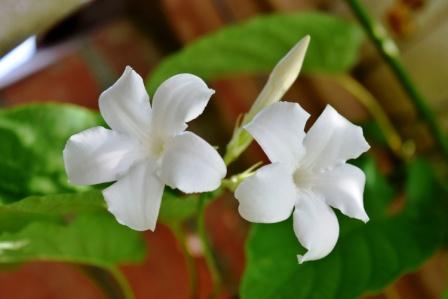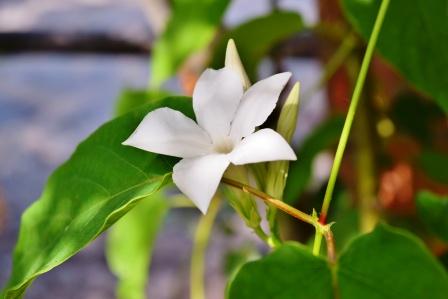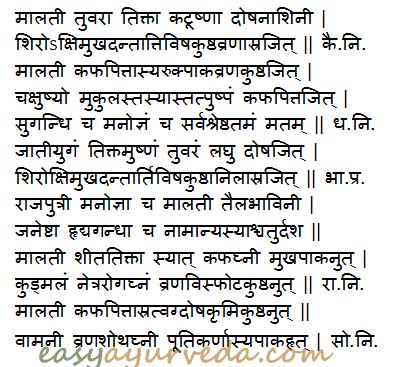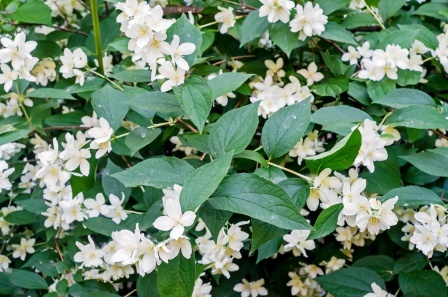Jasmine – Chameli: Benefits, Remedies, Research, Side Effects
Jati – Jasminum grandiflorum is an Ayurvedic medicinal plant, used for the treatment of wounds, skin diseases, ulcers of the oral cavity, gingivitis, headache, erectile dysfunction and eye diseases.
Latin name- Jasminum grandiflorum Linn.
Jasminum sambac and Jasminum officinale are also used in the name of Jati.
Family- Oleaceae (Parijata Kula)

Table of Contents
Vernacular names
Names in different languages:
Hindi name- Chameli
English name- Spanish or Common Jasmine
Arabic name- Yasmin
Bengali name- Chameli
Gujarathi name- Chabeli
Kannada name- Mallige
Parsi name- Saman
Tamil name- Malligai
Telugu name- Jai puvvu
Sanskrit synonyms
Hrudya gandha- The fragrance pleases the heart
Manojna, Sumana/ Cetika – The fragrance refreshes the mind
Ratripushpa/Sandhyapushpi- The flowers bloom during night
Malati – It has beautiful flower
Varshabhava – Flowering during rainy season
Rajaputri, Surapriya, Jati, Priyamvada, Chetika, Tailabhavini, Surapriya,

Morphology
Morphology of Common jasmine:
Jati is a small plant growing naturally and cultivated all over India, in the temperate climate, for its flowers. The leaves are dark green in color. The flowers are white with fragrance and bloom in the rainy season. Jasminum officinale is also used as the synonym Latin name for Jati.
Classical categorization
Jati – Classical categorization:
Charaka- Kushtagna – skin disease relieving group of herbs
Bhavaprakasha- Pushpa varga
Dhanvantari Nighantu- Amradi varga
Kaiyyadeva Nighantu- Oushadhi varga
Raja Nighantu- Karaveeradi varga
Shodala Nighantu- Amradi varga
Scientific classification
Kingdom: Plantae
Order: Lamiales
Family: Oleaceae
Genus: Jasminum
Species: J. grandiflorum
Properties, part used, dosage
Jasminum grandiflorum medicinal properties:
Rasa (Taste) – Tikta (Bitter), Kashaya (Astringent)
Guna (Qualities) – Laghu (Light for digestion), Snigdha (Slimy)
Vipaka – – Katu (Undergoes Pungent taste after digestion)
Veerya (Potency) – Ushna (Hot)
Karma (Actions) – Tridoshahara (Reduces all the three dosha)
Part used- Leaf, Flower, Root
Dosage-
Powder of dried leaf – 5 to 10g
Fresh juice of flower- 5 to 10 ml
Decoction- 50 to 70 ml
Varieties
Bh. Pr. Ni – 1. Jati 2. Swarna jati
Chemical constituents, Uses
Jasminum grandiflorum chemical constituents:
The leaf of the plant contains ascorbic acid, anthranilic acid and its glucoside, indole oxygenase, alkaloid jasminine and salicylic acid. The flowers contain pyridine and nicotinate derivatives. The oil extracted from the plant yields benzyl acetate, benzyl benzoate, phytol, methyl jasmonate, linalool, geranyl linalool and isophytol.
Medicinal uses of Chameli – Jati:
- The paste of the root of the jasmine plant is applied as a face pack to improve the complexion.
- The fresh, tender leaf of the plant is chewed to relieve pain due to dental caries, mouth ulcers and in weak gums.
- The decoction of the leaf is used for gargling in cases of gingivitis and mouth ulcers.
- The paste of the root of the jasmine plant is applied over the forehead to relieve headache.
- The oil prepared from the root is applied over the affected area in sciatica, facial paralysis and general debility.
- The oil prepared from the root and flowers of the plant is applied over the scalp in cases of dizziness, vertigo and headache.
- Few drops of oil prepared using the leaf of a jasmine plant is poured inside the ear to relieve earache and pus discharge from the ears.
- The paste of the leaf, root and flower is applied over the affected area of skin diseases like scabies and itching.
- The oil prepared using the leaf of the jasmine plant is applied over the area affected with an open wound to heal it.
- The fresh juice of the flowers is dropped into the eyes to treat conjunctivitis and other eye disorders.
- The paste of the root of the plant is applied over the bladder area to relieve difficulty in micturition and dysmenorrhea.
- The paste prepared from the root of the plant is applied over the penile region in cases of erectile dysfunction.
- The cold infusion prepared from the flowers of jasmine is given in a dose of 40-50 ml to treat fever.
- The perfume of the flowers obtained through distillation method is commercially used.
Sanskrit verse

Indications
Ayurvedic indications:
Shiroroga – diseases of head, headache
Akshiroga – eye disorders
Mukharoga – oral disorders
Dantaroga – teeth disorders
Visha – Toxic conditions, poisoning
Kushta – skin diseases
Vrana – Ulcers, wounds
Asra – blood disorders such as abscess, skin disorders, bleeding disorders such as menorrhagia, nasal bleeding etc.
Visphota – boils, blisters
Asyapaka – mouth ulcers
Putikarna – pus discharge in ears
Flower
Balances Kapha and Pitta Dosha
Adverse effect
No known adverse effect is reported after the use of jasmine plants . Some cases of allergy towards the fragrance of the perfume of jasmine flower is known.
Interaction with medicines, supplements
Can this be used while taking Homeopathic medicine?
Yes. This product does not react with homeopathic medicine.
Can this medicine be continued while taking supplements like multivitamin tablets, Omega 3 fatty acids etc?
Yes. Generally, this product goes well with most dietary supplements. However, if you are taking more than one product per day, please consult your doctor for an opinion.
With western
medicines
Seek your
doctor’s advice if you are taking this product along with other western
(allopathic / modern) medicines. Some Ayurvedic herbs can interact with modern
medicine.
If both Ayurvedic and allopathic medicines are advised together, then it is
best to take Allopathic medicine first, wait for 30 minutes and then take the
Ayurvedic medicine.
Ayurvedic medicines
Ayurvedic medicines containing Jati:
Velwak cream: Velwak Topical is a proprietary Ayurvedic medicine useful in treating cracked heels. It softens the skin by facilitating desquamation of dead cells, assists healing and reduces the associated pain.
Cardiraksh capsules: It is a proprietary Ayurvedic medicine to control hypertension, relieves stress and strain.
Kalyanaka kashaya choorna: It is a medicine in powder form useful to treat anemia, itching, intoxication, schizophrenia and anxiety. It is also indicated in infertility, loss of memory, amenorrhoea and fever.
Malatyadi taila: Malatyadi Tailam is an effective Ayurveda herbal oil for hair care. It is useful in Alopecia, hair fall and dandruff problems .
Trichoderm ointment: Trichoderm Topical is a proprietary Ayurvedic medicine useful as anti-fungal remedy for superficial fungal infections.
Paranthyadi taila: It is an herbal medicine, used mainly in the treatment of dermatitis, spider bite, pruritis, skin disorders etc.
Colicarmin drops: Colicarmin Syrup is a proprietary ayurvedic medicine useful to treat digestive disorders and acts as carminative.
Vasanth kusumakara rasa: Vasant Kusumakar Ras is an Ayurvedic medicine in tablet or powder form, used in treatment of diabetes, diseases related to urinary tract, memory loss etc.
Jatyadi ghrita: Jatyadi Ghrita is an Ayurvedic medicine, in herbal ghee form. This medicine is used for external application only. It is used externally in the treatment of deep seated wounds and ulcers, non- healing wounds with secretions.
Research
Research articles about Jasminum grandiflorum:
Anti- bacterial action: The extracts were subjected for screening of in-vitro antimicrobial activity against selected disease causing pathogens, viz., Staphylococcus albus, Proteus mirabilis, Salmonella typhii, etc., at concentrations of 500mg/ml, 250mg/ml. The results of antimicrobial activity revealed that all the extracts showed comparatively better activity than other extracts. They can be used as anti- biotic.
Anti- fungal action: The present study aims to evaluate the antifungal activity of J. sambac or Arabian jasmine, a flowering plant abundant in Southeast Asia against Malassezia sp. using disc diffusion and broth microdilution method. Skin samples from individuals with dandruff were cultured on Sabouraud dextrose agar overlaid with olive oil. The inhibition zones of methanol extract of flowers and leaves of J. sambac and essential oil of flowers showed potential for antifungal activity with inhibition zones of 11.10 ± 1.92, 12.90 ± 1.68, and 13.06 ± 0.26 mm, respectively, and minimum inhibitory concentration (MIC) values of 80 mg/mL to 160 mg/mL and 50%, respectively.
Author:
Dr.B.K.Prashanth M.D (Ayu), Ph.D
E mail: [email protected]
Jasmine home remedies
By Prof. MS Krishnamurthy
The plant is commonly found throughout India.
It balances all the three Doshas.

The plant undergoes a pungent kind of Bio transformation (Katu vipaka) and possesses Ushna veerya (Hot in potency). Salicylic acid jasminine alkaloids are the main constituents of this drug.Jasmine plant is used both for external application (majorly) and oral administration.
Jatyadi taila, Jatyadi ghrita are the important preparations of this drug.
Jasminum grandiflorum Remedies:
Chewing the tender leaves of Jasmine for mouth ulcers:
4-5 tender leaf buds are chewed regularly twice or thrice a day. This reduces the severity of the stomatitis. This acts as preventive medicine too.
Leaf decoction for washing the wounds and chancroid ulcers:
The matured green leaves are taken and decoction is made. This decoction is used to wash the wounds and ulcers.
General method of preparation of decoction (kashaya) – 1 tablespoon of powder is added with 2 cups of water, boiled and reduced to 1 cup, filtered.
Jasmine flower paste/garland application to suppress the breast milk:
This is a unique folklore practice. The flowers are made into garland and tied around the breast. Or else the fine paste of the flowers is applied around the nipples. This is said to be effective to suppress the breast milk in needy people.
Leaf oil for chronic skin diseases:
The leaves are made into fine paste and by adding coconut oil or sesame oil the oil is cooked (likewise ghee can also be cooked). This ghee or oil is effective to cure various skin diseases. There are several successful events where this simple preparation worked quite miraculously even in steroid dependent skin diseases.
Leaf fresh juice for conjunctivitis:
Fresh leaf juice obtained from the tender leaf buds is instilled to the eyes, in case of conjunctivitis. This is very effective and indicated in all the age groups and all seasons too.
Jasmine flowers are considered to be the auspicious offerings to the Gods. The flowers are considered to be aphrodisiacs also. The oleaginous extract of the jasmine flower is used abundantly in aromatherapy. Thus the drug jasmine appears to be unique in various contexts and ill health conditions.
Sthanika Karma (Systemic Action)
External Application – Its roots powder can be used as a scrubber to Improve complexion. For toothache its leaves can be used for chewing, Its decoction can be used for gargling in related mouth diseases. The decoction of its root can be used topically or poured on the head to treat headaches. Root paste can be used for external application in hemiplegia and facial palsy. Jasmine oil is beneficial in case of fainting, giddiness and in many other mental disorders. Indicated in itchy skin lesions. Oil prepared out of its leaves can be applied on the ear to treat otalgia and other ear diseases. Flower juice is beneficial in eye diseases, it can be administered as eye drops. In case of painful micturition and oligomenorrhea its leaf and flower paste can be used for external application. Leaf decoction and oil is indicated for cleansing and healing the wound. Flower is aphrodisiac, and promotes intellect and mind calming.
Internal administration-
Digestive System –Decoction of the root is useful in abdominal distension
Circulatory System – Act as blood purifier
Excretory System – It has diuretic action. Decoction is indicated in dysuria
Reproductive system –Aphrodisiac, indicated in dysmenorrhea
Satmikarana – Anti poisonous
Tvak (Skin) – Root decoction is indicated in skin diseases










